Did you know
The most common reason for young people to carry a knife is fear.
A record number of young people (aged 10 to 19) are now perpetrating violent crimes including robberies, assaults, sexual offences, and murders, according to the Crime Statistics Agency.
Knives have also become a major contributor to the surge in violent youth crime. But children and young adults are increasingly becoming victims of knife assaults and murders.
As part of this project, YAY were helped by Gilbert & Tobin (a leading Australian law firm) to access information from Victoria Police, as a Freedom of Information request, relating to the incidences of Knife Crime in Victoria from 2017 to 2021.
The consequences for stabbing someone may be time in Jail, or extensive community service, fines, diversion. Depending on your history of violence or crimes depends on the harshness of the consequences.
If you are only caught with a knife but have not hurt anyone you are still breaking the law, however the consequences are less severe, you may be just fined, or given a warning if you don’t have a reason to be carrying the knife.
When Ali* was caught and sentenced to youth detention for using a knife to commit an aggravated burglary, the impact of his crime was felt across his family and his community. Ali’s mother was shunned at her local church, and her neighbours would not let their children play with Ali’s siblings. His mother was scared to go out in public, such was the shame was brought on Ali’s family.
*Not Ali's real name.
142 Victims were treated for knife assults in 2021-22, according to the Victorian Injury Surveillance Unit.

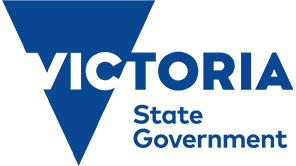
Everyone deserves to feel safe in their local community, and as the instances of young people carrying knives increases, so does the chance that a weapon may be used simply due to its accessibility.
As a community we need to find ways to support the young people who carry a knife because they are fearful for their safety and engage with those young people who are at risk of antisocial behaviour that may lead to knife crime.

When YAY undertook its research with Victoria University, there were two key findings in relation to why young people may choose to carry a weapon.
Young people fear being the targets of victimization, a weapon provides security and prevents vulnerability. Many young people state that they carry weapons to protect themselves from physical attack or being robbed and not to harm. Many of these young people have been victims of violence, have witnessed it or have been threatened with knives in the past. Others decide to arm themselves, only because they believe that other people in the school or local area carry knives.
The second reason why young people carry a weapon was about identity. Young people are confused about their identity and where they fit. Be it the push and pull between cultural or religious identity and their need to be part of a collective, with friends or at school.
Often, young people are conflicted about which cultural, social, family, school, work, media identity they fit into. Wanting to be part of a collective can mean being part of a peer group that engages in risky behaviour. For example, ‘if my friends are carrying weapons, I might feel the pressure to do the same'.
Did you know
The most common reason for young people to carry a knife is fear.
In 2022, YAY facilitated Community Conversations involving 10 Melbourne City Councils.
These conversations aimed to proactively engage with the community regarding the ongoing impact of knife crime. YAY gathered community feedback, assessed the current impact, gained insights from key stakeholders, including Victoria Police, youth-based services, and faith/community leaders.
This was such a valuable exercise for YAY to undertake, and we believe that it will be just as valuable for your local community.

Where possible, we recommend that invitations are provided to the following list of organisations who may be able to help answer some of the questions that might come up in your Community Conversation:
Emergency Services representatives; Victoria Police and Ambulance Victoria
Victoria Police and Ambulance Victoria are first responders to incidents within our community and are the first touch point in many cases when it comes to young people, and knife crime. Victoria Police have Community Liaison Officers who may be able to attend your Community Conversation and help answer questions about knife crime.
Local Youth Agency (contact details can be provided by your Local Council or Shire offices)
Councils and Shires across Victoria deliver a range of programs and services especially targeted towards young people. Youth Workers within the Council and Shires also collaborate with local service providers. Having a youth worker attending your Community Conversation is valuable, as they can provide specific insights and examples that are relevant to your community.
Emergency Department (Local hospital staff, Nurses, Emergency Department Staff)
Staff from your local hospital and primary care centers can provide insights into the physical impact of knife crime and the care needed for those affected. Staff may also have examples to share that will help educate the community on knife crime.
Local Principal/Department of Education Regional representative
Speaking with a representative from your local school or education provider can also provide insights into ways that the community can support young people who may be disengaged or at risk of carrying a knife or committing a knife crime.
By starting a conversation within your community, working collaboratively with service providers, and engaging with young people, together we can help keep disengaged and at-risk young people on track, so they can play a valuable role within their community.
Our YAY-led Community Conversations produced many suggestions on how to mitigate the issue of knife crime, including some of the following:
Increase community conversations
Increase conversations between Government Departments and agencies (including Victoria Police and Ambulance services), service providers, community organisations and young people and their families about issues in the community.
Identify and facilitate employment pathways
Identify and facilitate pathways including employment and training programs in the regions, for young people who have skills and training but lack opportunities. Employment can provide financial stability, responsibility, and purpose for a young person.
Establish diverse recruitment policies
Establish policies within the education system to ensure that there are more staff employed, or working as volunteers, that reflect the community where these young people are from. There are hundreds of culture represented in Victoria, from Indigenous and First Nations people to more recent migrants from countries across Europe, Asia and Africa.
Design a community focused media campaign
Design a campaign that delivers the message that knife carrying is “uncool” to change the narrative, and educate on the impact of knife crime, such as only being able to see your family from behind bars.
Hold events for young people
Hold events that are developed and led by young people, giving young people a sense of agency and ownership in their local community.
Hold events for young people
Hold events that are developed and led by young people, giving young people a sense of agency and ownership in their local community.
Download a range of resources that can be used by your community or can be used to inspire your community to create your own message about knife crime.
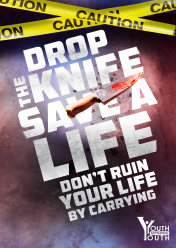
Speak with your local Council or Shire about where posters can be put up. Offer them as a resource to schools, Community notice boards, Neighborhood Houses or Community Centers, Public Library and other public spaces in your local area.
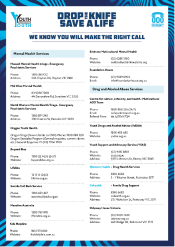
Download this contact list that can be displayed within your local community. It contains local youth services, contact details and websites. Feel free to use the template to create your own.
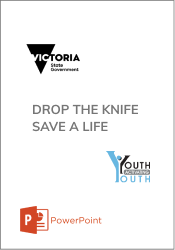
A PowerPoint presentation that can be used by Community groups to help facilitate their Community Conversation.
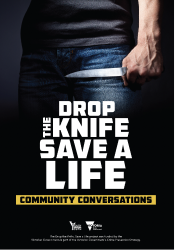
Law firm Gilbert and Tobin aided YAY in gaining access to valuable information and statistics about youth knife crime trends in Melbourne between 2017 and 2021.
YAY commissioned a report titled 'Drop the Knife: Community Conversations', with academic partners Victoria University prepared by Dr John Martino of the Youth and Community Research Group, College of Arts and Education, Victoria University.